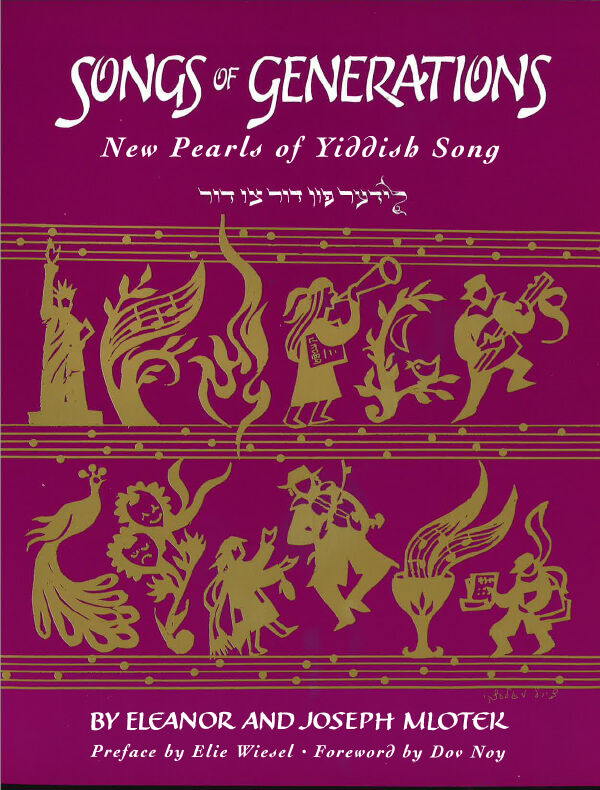This folksong has several melodies, two of which are presented here. One was printed in the arrangement of E. Sheinin for chorus in Gezang un kamf, no. 3 (1935); it was also published by Mikhl Gelbart (1951).
The second melody was collected by the compilers from composer Ben Yomen. The stanza, beginning with “Hodi dir tsu veynen” derives from a poem “Der arbeter” (The Worker) by Dovid Edelshtat. 34 folk variants of Edelshtat’s song were collected and analyzed by folklorist S. Z. Pipe (see Dov Noy and Meir Noy, Yidishe lider fun galitsye).
Edelshtat’s original poem was published in the New York Varheyt on June 7, 1889. There he called it an adaptation from the Russian poet Nekrasov. Pipe however found that the poet adapted the first three stanzas from a poem “Duma tkatcha” by Sergei Sinieguborn. Edelshtat’s poem was also folklorized in the song “Shnel loyfn di reder” in this book. R. Pups notes an adaptation that was sung during the Holocaust in Bielsk and Bendin: “Her shoyn oyf tsu veynen/ Un trern tsu fargisn, / Di tsayt fun shtarbn kumt shoyn on, / Oy vey! oy vey! oy vey!”

It’s snowing, it’s snowing,
day and night, day and night,
but I sew, but I sew,
and I think and I think.
Outside, it is raining,
outside, it is raining,
and it is snowing, snowing,
and it is snowing, snowing.
My young years
I have forfeited
sitting at my sewing all the time.
Enough crying from you
enough wailing,
you will stain your work
and the foreman, that murderer,
will drive you away, out of the job.
S’falt a shney, s’falt a shney,
Tog un nakht, tog un nakht,
Nor ikh ney, nor ikh ney,
Un ikh trakht, un ikh trakht.
In droysn geyt a regn,
In droysn geyt a regn,
Un es falt a shney, a shney,
Un es falt a shney, a shney,
Mayne yunge yorn
Hob ikh ongevorn
Zitsndik shtendik baym geney.
Zumer geyt a regn
Zumer geyt a regn
Zumer geyt a regn,
Zumer geyt a regn
Un vinter falt a shney,
Un vinter falt a shney;
Mayne yunge yorn
Hob ikh ongevorn
Baym fintstern geney.
Hodi dir tsu veynen,
Hodi dir tsu klogn,
Du vest makhn oyf der arbet a flek;
Bald vet arayn
Der mayster, der merder,
Traybt er dikh fun der arbet avek.
ס׳פֿאַלט אַ שנײ, ס׳פֿאַלט אַ שנײ,
טאָג און נאַכט, טאָג און נאַכט,
נאָר איך נײ, נאַר איך נײ,
און איך טראַכט און איך טראַכט.
אין דרױסן גײט אַ רעגן,
אין דרױסן גײט אַ רעגן,
און עס פֿאַלט אַ שנײ, אַ שנײ,
און עס פֿאָלט אַ שנײ, א שנײ,
מײַנע יונגע יאָרן
האָב איך אָנגעװאָרן,
זיצנדיק שטענדיק בײַם גענײ.
זומער גײט אַ רעגן
זומער גײט אַ רעגן
זומער גײט אַ רעגן
זומער גײט אַ רעגן
און װינטער פֿאַלט א שנײ,
אין װינטער פֿאַלט אַ שנײ;
מײַנע יונגע יאָרן
האָב איך אָנגעװאָרן
בײַם פֿינצטערן גענײ.
האָדי דיר צו װײנען,
האָדי דיר צו קלאָגן,
דו װעסט מאַכן אױף דער אַרבעט אַ פֿלעק;
באַלד װעט אַרײַן
דער מײַסטער, דער מערדער,
טרײַבט ער דיך פֿון דער אַרבעט אַװעק.
Song Title: S’falt A Shney

The Songs of Generations: New Pearls of Yiddish Song anthology comprises songs that were either never printed before or appeared in rare and inaccessible publications — sometimes in different versions and without proper sources. Most of the songs in this book were submitted by readers of Chana and Yosl’s column “Perl fun der yidisher poezye” (Pearls of Yiddish Poetry) in the Yiddish newspaper Der Forverts (The Forward), initiated in October, 1970. Over 25 years, thousands of songs were collected in correspondence and on cassettes from readers throughout the world, and they represent a veritable national Yiddish song archive. Chana Mlotek, in her introduction, writes, “In the course of years the inquiries, contributions and enthusiasm of these readers have kept our own interest unflagging and have reinforced our dedication to this effort. And in recent years our participants have also been augmented by new readers from the former Soviet Russia, who receive our newspaper there or from newly-arrived immigrants in this country and Israel.”